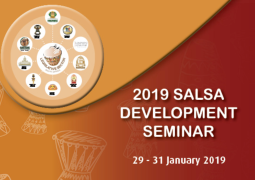
Delineating the achievements of Salsa (the Secretaries Association of the Legislatures of South Africa) to date, during his reflection on the transition of the legislative sector towards realising a strengthened South African democracy, the Secretary of the Free State Legislature, Mr Thabo Mofokeng, said this legislative body has managed to come up with a well-coordinated model that informs how the sector conducts its oversight.
This has been supplemented by a sound public participation model that “reflects the diversity of the South African population in terms of gender, geography, language, religion, and ethnicity – and that has a feedback mechanism to ensure that the sector has a report-back mechanism factored in its public participation model”.
One of Salsa’s milestones is the adoption of a parliamentary institute, he said. This entity would be a knowledge hub of the sector, that will be responsible for the development of its academic discipline. “Over the years we have amassed a lot of information and knowledge which is currently not structured. This institute will serve as a vault for the knowledge and information we have garnered over time. And it will be a springboard for academic studies on the sector.”
Coupled with that, there will be a Parliamentary Training Centre for Members of Provincial Legislatures and Parliament, he pointed out, to ensure that they adhere to outcomes-based plans and to tap into the central data repository of the sector to improve the nature and character of their work.
But in his opinion, Salsa’s main resolve is to ensure that the strategic framework of the sector is aligned to the National Development Plan and other regional and global treaties and agreements that the sector is party to.
According to him, its challenges remain that of ensuring that it continues to provide strategic management and technical support to the Speakers’ Forum to “ensure that there is more uniformity in how legislatures do their work”.
All these initiatives point to the fact that “we are as Salsa continuously developing a tool kit to build an effective and efficient legislative sector”, he concluded.
Speaking on “The Role of Parliament in a Robust Political Environment”, Prof Tinyiko Maluleke, stressed that whenever we speak of a new South Africa, we speak of a miracle. And often when we do so we refer to the fact that our democracy came peacefully. But for him “the true miracle is the first democratic Parliament. Where did its Members of Parliament come from? They came from our country’s jails, from villages with no training whatsoever, but they carved out our first democratic transition. That is the miracle we often pass over too quickly.”
He also stated that we as South Africans often speak about the Triple Challenge of unemployment, poverty, and inequality, but there is now a fourth challenge of corruption. “it is as real as poverty and inequality and should be dealt with it as such.”
But at the heart of the challenges that our country is faced with is education, he maintained. “We have an education system that is under-performing, that mismatches what our country requires. Until we address that, our transformation dreams may not be realised.”
Interestingly, he pointed out, the judiciary has become a substitute for our Parliament, “it has stepped in when things fall apart. That is not ordinarily wrong, but when it has to oversee Parliament and tell it what it has done wrong, that worries us”.
“For it to gain its credibility, Parliament must be a site upon which the hopes and dreams of the Rainbow Nation are manufactured. A site where human dignity is elevated, a place that affords South African a privilege to walk tall and not to go to bed hungry in a country of plenty.”
A lot can be learnt from Mandela, he proposed. Unlike many other people, Mandela stated in his last speech in Parliament that while he was the head of the state, it was a profound privilege for him to be accountable to Parliament. How do we help the executive to recognise that accountability to Parliament as a privilege than a disgrace?
He further stated that the role of Parliament in robust political environment is to ensure that it is both the mirror and the window to our political, economic and moral challenges. “Parliament ought to be a mirror unto us as a nation because people invested hope and trust to parliamentarians for a better life.”
But for it being a mirror only is not enough, it should also be a “window that would allow us to see beyond the four walls of where we are. As such, Parliament should concern itself with repealing past laws, but it should also be concerned about passing laws aimed at addressing our future”.
Most of all, our Parliament should be a reservoir of moral courage, he opined. “Currently, a courage is missing in Parliament to insist on doing the right thing. There is a lack of courage to speak truth to power; to the executive.”
By Abel Mputing
29 January 2019

